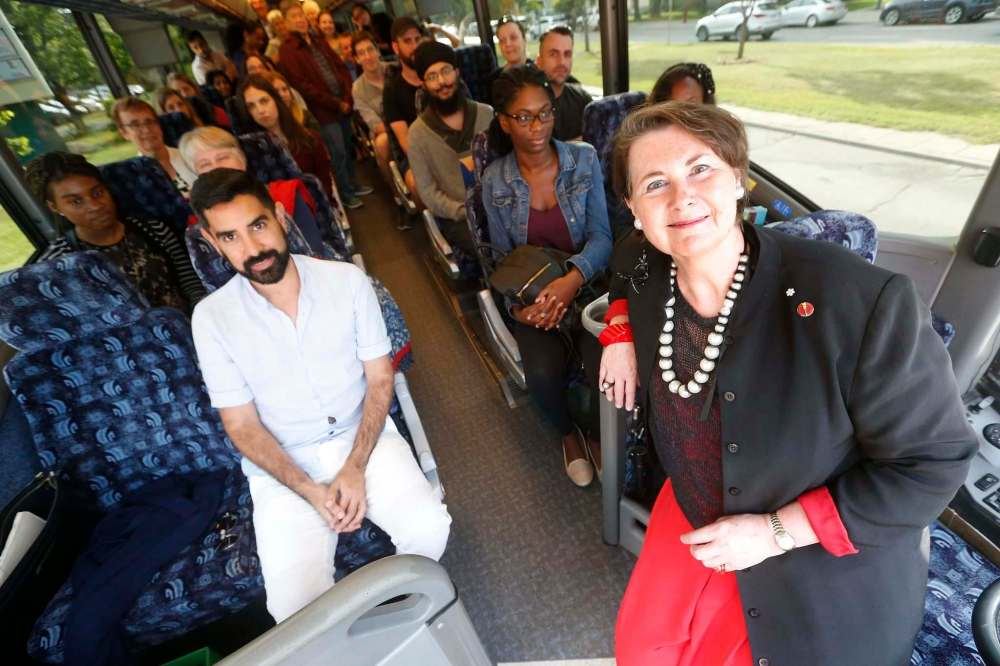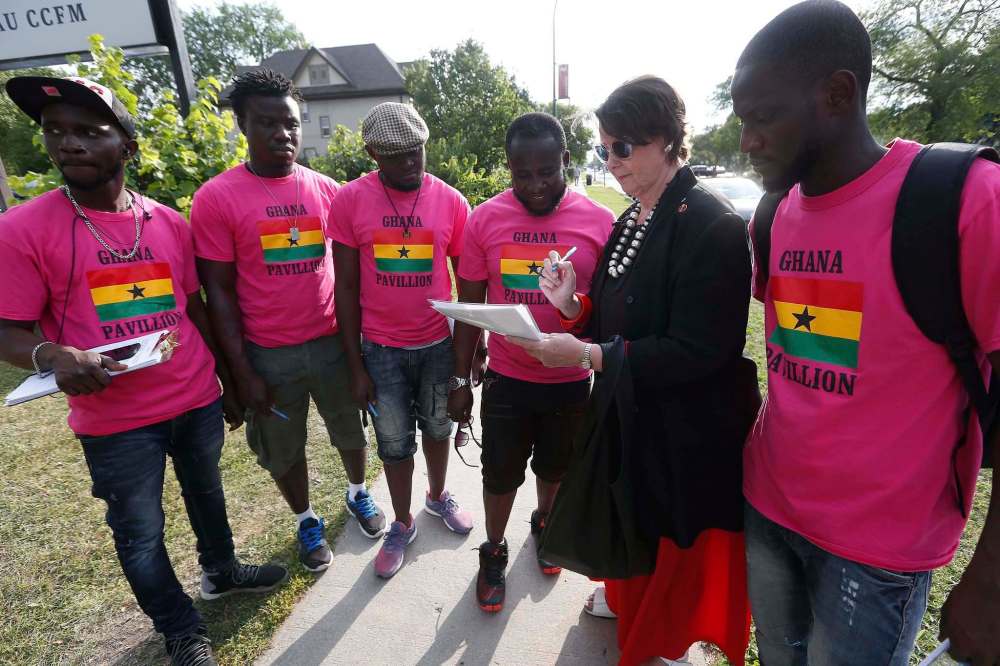This city is their classroom
Summer course uses Folklorama, current affairs as learning tools
Advertisement
Read this article for free:
or
Already have an account? Log in here »
To continue reading, please subscribe:
Monthly Digital Subscription
$1 per week for 24 weeks*
- Enjoy unlimited reading on winnipegfreepress.com
- Read the E-Edition, our digital replica newspaper
- Access News Break, our award-winning app
- Play interactive puzzles
*Billed as $4.00 plus GST every four weeks. After 24 weeks, price increases to the regular rate of $19.95 plus GST every four weeks. Offer available to new and qualified returning subscribers only. Cancel any time.
Monthly Digital Subscription
$4.99/week*
- Enjoy unlimited reading on winnipegfreepress.com
- Read the E-Edition, our digital replica newspaper
- Access News Break, our award-winning app
- Play interactive puzzles
*Billed as $19.95 plus GST every four weeks. Cancel any time.
To continue reading, please subscribe:
Add Free Press access to your Brandon Sun subscription for only an additional
$1 for the first 4 weeks*
*Your next subscription payment will increase by $1.00 and you will be charged $16.99 plus GST for four weeks. After four weeks, your payment will increase to $23.99 plus GST every four weeks.
Read unlimited articles for free today:
or
Already have an account? Log in here »
Hey there, time traveller!
This article was published 09/08/2017 (3099 days ago), so information in it may no longer be current.
For a summer course called Emerging Issues in Human Rights that uses the city as its classroom, the emergence of a group of LGBTTQ* asylum seekers calling themselves the Ghana pavilion couldn’t have been timed better.
“It will come up in my class,” said Global College instructor and Manitoba Sen. Marilou McPhedran, who created the course seven years ago at the University of Winnipeg.
“Sexual orientation and gender identity are always an issue students are open to address,” she said.

After being named to the Senate in 2016, she returned to Winnipeg and is using her summer break to teach the intensive 10-day, six-credit course. Every year, she uses the city, its sites and its issues as its textbook — including Folklorama.
This year, outside various Folklorama pavilions, eight men wearing pink T-shirts that read, “Ghana Pavilion” on the front and “LGBTQ Rights Now!” on the back are collecting signatures on a petition calling on Ghana to decriminalize homosexuality.
“It’s great,” Sulemana Abdulai said Tuesday. “We’ve collected between 2,000 and 3,000 signatures.”
The former fashion designer said he was forced to flee Ghana for safety after he was outed and his shop set on fire. Abdulai organized fellow LGBTTQ* refugee claimants who walked over the border earlier this year to ask Canadians to support the petition they plan to present to Canada’s prime minister, global affairs minister and Ghana’s high commissioner to Canada.
On Tuesday night, they planned to return to the area outside the Caribbean pavilion to collect signatures as well as visit The Forks.
Abdulai said they have to keep their distance from Folklorama pavilions. “When we go there, they chase us off their property, so we came to the sidewalk.”
Folklorama keeps its distance from politics or activism and did not respond to a request for comment.
McPhedran said if her students encounter the LGBTTQ* Ghanaians at a pavilion, they will be able to sign their petition if they choose. On Tuesday night, her students were to start at the Caribbean pavilion.
“On the way, I do a mini-lecture on some of the pressing human rights issues in the places we’re visiting,” she said.
Once they get there, the lecturing stops, McPhedran said. “When we’re inside the pavilions we’re there to be respectful and celebrate with the volunteers who worked so hard to celebrate their culture.”

Over the next nine days, there will be plenty of lively discussion and learning in the classroom, at the Canadian Museum for Human Rights and with more than 20 guest lecturers with first-hand knowledge of what’s required to have “lived rights” — not just those entrenched in laws and codes.
“There’s a difference between knowing about your rights, claiming your rights and what it actually takes in your community, your country — globally — to live your rights.”
Emerging Issues in Human Rights runs to Aug. 18 in collaboration with the Canadian Museum for Human Rights and with scholarship support from Rotary 5550 World Peace Partners, McPhedran said. A portion is taught in the museum with classes at several locations, using the city as a “living campus,” she said. “It’s to place the entire course in the multicultural context — in the living of rights and all the contradictions, complications, difficulties and frankly a lot of the heart-break of claiming your rights.”
Winnipeg Harvest, Ma Mawi Wi Chi Itata Centre and Ka Ni Kanichihk will serve as some of their classrooms, McPhedran said. At the class conducted at the food bank, they look at the right to food and the right to water and the reality that people experience — “how structurally we perpetuate the denial of rights.”
The course looks at the law, the Canadian Charter of Rights and Freedoms, global declarations of human rights and provincial human rights codes and what it takes for people to have their rights recognized, she said — “what’s an aspirational articulation and what’s really going on.”
“I make the point that very often we see examples of customs and culture that become elevated by government and the dominant society as rights when they’re not — they’re rules because they’re instituted wrongs which deny rights. We unpack all that.”
carol.sanders@freepress.mb.ca

Carol Sanders
Legislature reporter
Carol Sanders is a reporter at the Free Press legislature bureau. The former general assignment reporter and copy editor joined the paper in 1997. Read more about Carol.
Every piece of reporting Carol produces is reviewed by an editing team before it is posted online or published in print — part of the Free Press‘s tradition, since 1872, of producing reliable independent journalism. Read more about Free Press’s history and mandate, and learn how our newsroom operates.
Our newsroom depends on a growing audience of readers to power our journalism. If you are not a paid reader, please consider becoming a subscriber.
Our newsroom depends on its audience of readers to power our journalism. Thank you for your support.
History
Updated on Wednesday, August 9, 2017 7:25 AM CDT: Photos added.
Updated on Wednesday, August 9, 2017 7:30 AM CDT: Photos reordered.


